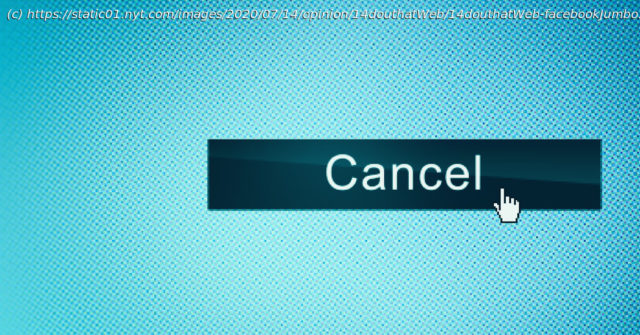What we talk about when we talk about “cancellation.”
Cancel culture is destroying liberalism. No, cancel culture doesn’t exist. No, it has always existed; remember when Brutus and Cassius canceled Julius Caesar? No, it exists but it’s just a bunch of rich entitled celebrities complaining that people can finally talk back to them on Twitter. No, it doesn’t exist except when it’s good and the canceled deserve it. Actually, it does exist, but — well, look, I can’t explain it to you until you’ve read at least four open letters on the subject.
These are just a few of the answers that you’ll get to a simple question — “What is this cancel culture thing, anyway?” — if you’re foolish enough to toss it, like chum, into the seething waters of the internet. They’re contradictory because the phenomenon is complicated — but not complicated enough to deter me from making 10 sweeping claims about the subject.
So here goes:
“Reputation” and “employment” are key terms here. You are not being canceled if you are merely being heckled or insulted — if somebody describes you as a moron or a fascist or some profane alternative to “Douthat” on the internet — no matter how vivid and threatening the heckling becomes. You are decidedly at risk of cancellation, however, if your critics are calling for you to be de-platformed or fired or put out of business, and especially if the call is coming from inside the house — from within your professional community, from co-workers or employees or potential customers or colleagues, on a professional message board or Slack or some interest-specific slice of social media.
There is no human society where you can say or do anything you like and expect to keep your reputation and your job. Reputational cancellation hung over the heads of Edith Wharton’s heroines; professional cancellation shadowed 20th-century figures like Lenny Bruce. Today, almost all critics of cancel culture have some line they draw, some figure — usually a racist or anti-Semite — that they would cancel, too. And social conservatives who criticize cancel culture, especially, have to acknowledge that we’re partly just disagreeing with today’s list of cancellation-worthy sins.
The canceled individual hasn’t lost any First Amendment rights, because there is no constitutional right to a particular job or reputation. At the same time, under its own self-understanding, liberalism is supposed to clear a wider space for debate than other political systems and allow a wider range of personal expression. So you would expect a liberal society to be slower to cancel, more inclined to separate the personal and the professional (or the ideological and the artistic), and quicker to offer opportunities to regain one’s reputation and start one’s professional life anew.
“It’s a free country,” runs the American boast, and even if it doesn’t violate the Constitution, cancellation cuts against that promise — which is one reason arguments about cancel culture so often become arguments about liberalism itself.
On the other hand, a skeptic might say that it wasn’t liberalism but space and distance that made America a free country — the fact that you could always escape the tyrannies of local conformism by “lighting out for the territory,” in the old Mark Twain phrase. But under the rule of the internet there’s no leaving the village: Everywhere is the same place, and so is every time.






